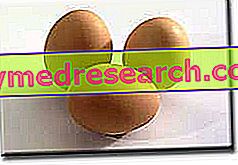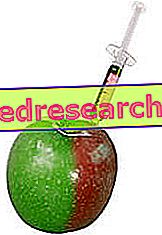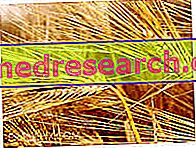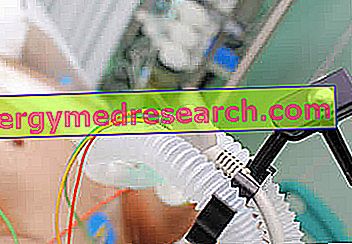Food | Cholesterol [mg / 100g] |
| Eggs, egg white | 0 |
| Eggs, yolk | 1337 |
| Whole eggs | 371 |
| Soft-boiled or hard-boiled egg | 371 |
| Egg, omelette or scrambled | 411 |
Total cholesterol in foods »
Eggs (yolk) and cholesterol
An egg weighs on average 61g, the shell 8g, the albumen 37g and the yolk 16g.
A medium-sized egg contains around 220mg of cholesterol, about 80% of the recommended daily requirement; cholesterol concentrates everything in the yolk, in other words the central red part: it is estimated that in 100 grams of yolk are present approximately 1.34g (1340mg) of cholesterol.

Egg white or egg white is rich in protein, low in fat and free of cholesterol; it contains avidin, a substance that binds to vitamin H (biotin) forming an indigestible complex and hindering its absorption. However, it is sufficient to avoid consuming it raw, as avidin, being thermolabile, can be inactivated by cooking allowing the absorption of biotin.
On the other hand, cooking can become a source of other problems; in the presence of the shell (eg boiling), if excessive, it determines the chemical combination of some substances that originate iron sulphide, a VENEFICO compound for the organism. Therefore, during the preparation of boiled eggs, it would be good to limit the boiling time to a maximum of 10 minutes.
That whole eggs are a high cholesterol food is undeniable! However, the numerous beneficial properties and high nutrient content cannot be ignored either. These include lecithin, a substance that reduces cholesterol absorption by optimizing the lipid profile. Moderate egg consumption is also associated with:
- A good protein intake with high biological value
- A good vitamin supply
- A good supply of heme iron.
NB . The egg (based on the cooking method) is a "fairly" digestible food!
The reasons why, in the absence of particular contraindications, it would be possible to consume more eggs than those recommended by the guidelines may be different; first of all, cholesterol introduced with food contributes only in part (about 30%) to the increase of cholesterolemia; moreover, a healthy organism is able to regulate the absorption of cholesterol reducing it if the diet brings excessive quantities. Finally, cholesterol is NOT the only one responsible for the increased risk of cardiovascular disease; it is therefore necessary that abnormal cholesterol levels are associated with other risk factors such as: smoking, obesity, a sedentary lifestyle and a diet rich in saturated fats.
In the presence of hypercholesterolemia, or of one of the aforementioned risk factors, it is therefore necessary to replace as much as possible saturated fatty acids with polyunsaturated ones, contained above all in fish and in particular in the blue one and / or living in the cold northern seas.
It is therefore good practice to limit the consumption of eggs DRASTICALLY only in cases of proven hypercholesterolemia or in the presence of diseases that require constant monitoring of cholesterol blood levels; otherwise, it is possible to consume eggs "almost" with a certain freedom, being careful not to overdo it and not to combine them with other foods rich in cholesterol such as some offal and crustaceans, or foods rich in animal fats such as sausages, butter and cheese (better to maintain the consumption of eggs between 3 and 6 units per week).
NB . Finally, it should be noted that many foods of confectionery origin and fresh or dried egg pasta contribute to increasing their overall intake (one egg for every 100g of product), frequently exceeding the recommended rations (about 3 eggs a week for a healthy and sedentary person) ).
In terms of cholesterol, if desired, go ahead with the consumption of egg whites, which can be managed more freely and associated with up to 3 or 4 for each yolk used.
Delicious omelette with egg whites: lots of flavor and protein WITH FEW FATS
Egg White Omelette - Protein Omelette for Muscle Mass
X Problems with video playback? Reload from YouTube Go to Video Page Go to Video Recipes Section Watch the video on youtubeWatch our video recipes and learn how to prepare Desserts without eggs and cholesterol



